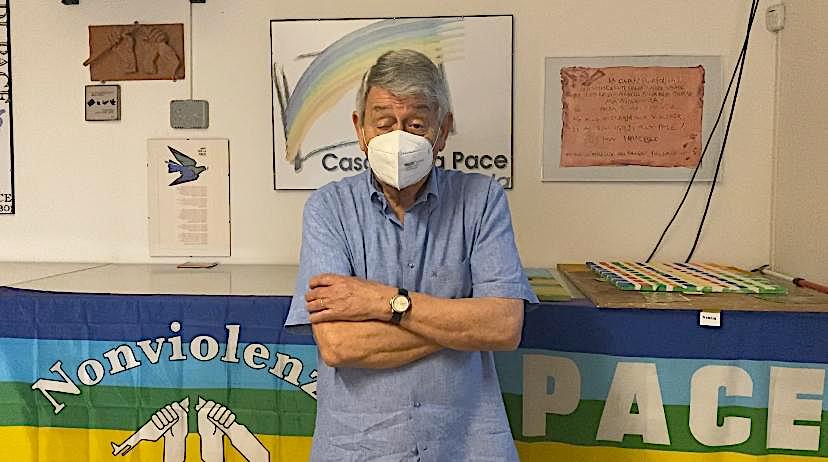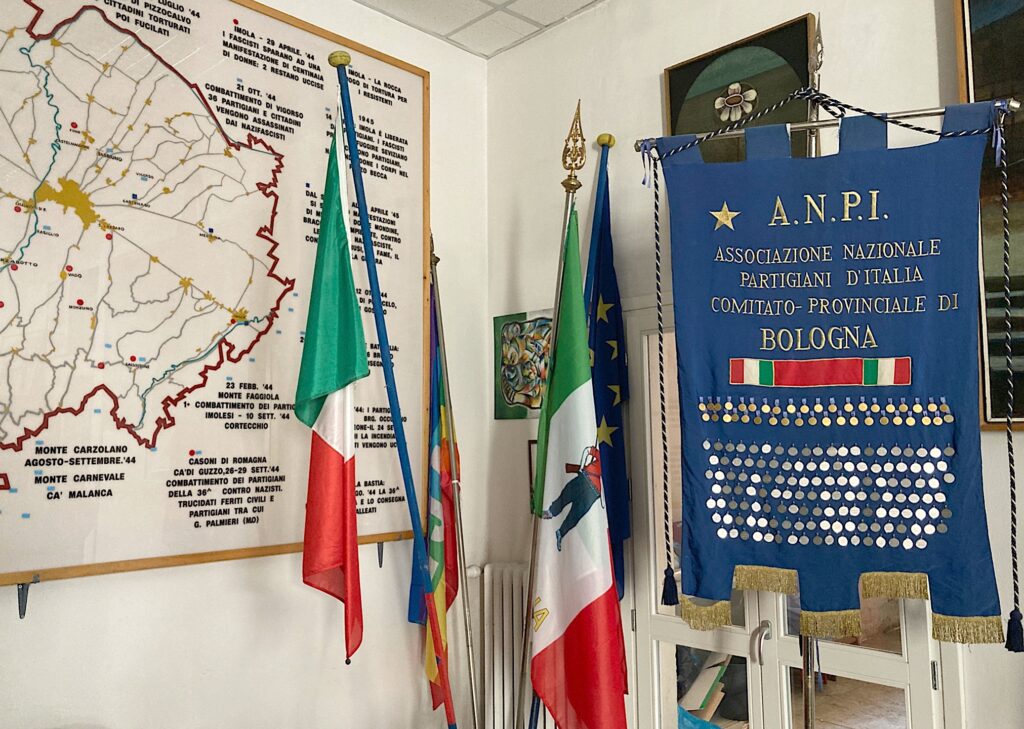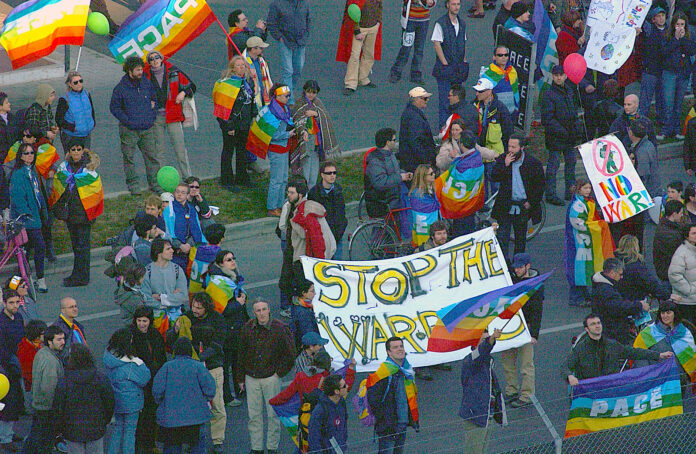Italians vividly remember the devastations of war – and older residents in particular are calling for the Russia-Ukraine conflict to end.
The consensus among older peace activists is that Italy should avoid sending weapons to Ukraine. They believe that diplomacy and conversation are more appropriate ways to resolve the conflict.
“Peace is not free. But the cost is incredibly low compared to that of war,” argued Mauro Innocenti, 70, of Pax Christi, an international Catholic movement working to promote peace through religion.
With almost a quarter of the population aged 65 and above, Italian memories of the carnage of WWII are still very strong. Peace groups, whose leaders are often in their 50s, 60s, and 70s, have been active since the Yugoslav wars of the 1990s.
Now, activists are protesting against the escalation of the Russian war in Ukraine, while simultaneously working to aid war refugees.
The National Association of Italian Partisans, a civilian resistance effort founded in 1945 to fight fascism, supports the same anti-war line.
“We’re committed to sending aid and showing solidarity with Ukrainians,” said Bologna chapter President Anna Cocchi. But ANPI opposes sending weapons to Ukraine to help the country fight the Russian invasion. The group considers peace a basic human right, and argues that exacerbating the war by sending weapons to Ukraine would jeopardize this right for Ukrainians.
Italy and the Ukraine war

The Italian government began sending weapons to Ukraine as soon as Russia invaded, even though 48 percent of Italians surveyed said they opposed armament. Italian Defense Minister Guido Crosetto has asserted the government would keep supplying Ukraine with weapons until any peace talks began. The government, which through January 2023 had sent about $700 million in arms to Ukraine— about the same amount as France, but far less than the United States (by far the leader, sending nearly $47 billion in arms) or the UK (the second largest supplier, sending $5.1 billion), has committed to supplying weapons through 2023.
Italian Prime Minister Georgia Meloni has been a steadfast backer of the Ukrainian defense.
“Given our principal challenge today, Italy strongly supports the territorial integrity, sovereignty and freedom of Ukraine,” Meloni said in November 2022. “The political cohesion of the alliance and our full commitment to supporting the Ukrainian cause are, from our point of view, the best response that NATO allies can give.”
Given the divergent views, tensions between peace organizations and the state are running high.
Ordinary Italians at first jumped enthusiastically to Ukraine’s defense, but are now having second thoughts, said Alberto Zucchero, another leading figure in Portico della Pace.
“At the beginning, there was more cohesion and unity,” Zucchero said. “Everyone went to the street to protest, and to support the victims in Ukraine who were attacked. Immediately the European Union and Italy agreed to collaborate with the allies from NATO.
“But then, the people started to think. Now, after 104 days since the beginning of the war, people are more aware of what’s going on. They are seeing that sending weapons to Ukraine did not do anything to stop the war.”
Young and old typically agree on one thing: that war is taking a toll, not only in Ukraine, but also in Italy.
Civic groups take the lead in refugee resettlement
“It took three months for the government to start talking about giving financial aid to Ukrainian refugees in Italy,” complained University of Bologna student Martina Sangoi. “The government didn’t do anything concrete to help. It was all volunteers.”
Portico della Pace – whose name pays homage to Bologna’s grand porticoes – is a peace organization devoted to helping Ukrainian refugees. It has taken the lead in local anti-war protests, and other anti-war initiatives.
Longtime Portico member Giovanni Paganelli, 78, works from the Casa per la Pace, a community center in the Bologna suburb of Casalecchio di Reno that maintains a comprehensive 70-year archive of political art and pacifist posters.
The Casa is helping Ukrainian refugees in Bologna, by teaching them Italian, and making them feel welcome.
“In order to achieve peace, we need to work on the economy, on relationships, and on solidarity,” Paganelli said.
Peace possibilities ignored

Portico activist and journalist Antonio Ghibellini complained that there’s too little news coverage of pacifism and nonviolence.
“Peace has always been widely ignored by the press, and kept only in local news,” said Ghibellini, who writes for international newspaper Pressenza. He believes this is “in order to prevent connection among pacifists.”
Pressenza works with pacifists in South America, France, Spain, and Italy to cover and spread awareness about pacifist movements in the world, he explained.
Sangoi, who speaks Russian, also expressed her disappointment in media coverage of the war, especially in the disconnect between Russian-generated and international news coverage of the war.
“There are completely different narratives you can read about,” Sangoi said, citing the skewed nature of the Russian press compared with of that Western news organizations like the BBC and the New York Times. “It’s so hard to be impartial when these views are so contradictory.”
Ghibellini lamented that, at least in Italy, only money-making news is considered newsworthy; he emphasized the importance of good journalism to capture stories that mainstream media won’t publish.
“Ukraine is reliant on journalists right now,” he said. “That’s the only way their story is making it to the Western world.”
Young voices: we should help refugees – but also fight
Younger Italians tend to be more supportive of supplying Ukraine with weapons.
Sending weapons to Ukraine is “true support,” argued Sangoi, 23, adding that if a country has the ability to aid in military defense, “I sincerely don’t see why not.”
When Russia invaded Ukraine, Sangoi and her friends decided to help resettle arriving Ukrainian refugees. They volunteered their interpretation skills at local hospitals, and donated food, clothes, and medicine.
So did student Gemma Grazzini, 23, though she agrees that Italian armament of Ukraine would only lead to more carnage on Ukrainian soil.
Grazzini thinks the war is taking a toll on the Italian economy, too. She cited the hefty portion of commerce Italy does with both Russia and Ukraine. Italy gets about 40 percent of its natural gas from Russia, and the war is driving already-high energy prices higher. There are intermittent fears of flour shortages.
“Ukraine produces a lot of flour, so there was a shortage here at the beginning of the war,” Grazzini said. “My mom would go grocery shopping and see signs in stores saying you could only buy one kilogram of flour per person.”
A rainbow flag proclaiming “PACE” – “peace” in Italian – hangs from the podium of the Church of the Madonna del Baraccano, where Mauro Innocenti and his wife Annarita host prayer circles for peace in Ukraine.
Psychological unease
The war is also affecting Italians’ mental health.
Camilla Biagioni, 26, said that when the war broke out, she felt anxious, and couldn’t sleep at night.
“I was afraid something might happen to me, or to my friends who live in Ukraine,” Biagioni said. “I had to stop reading the news for my sanity.”
Whether they support disarmament or not, Italians overwhelmingly crave peace.
“There is only one stance you can take in this war,” Sangoi insisted. “Either you support the people who are suffering and who did nothing to deserve this, or you support a dictator who is playing monopoly with human beings.”


